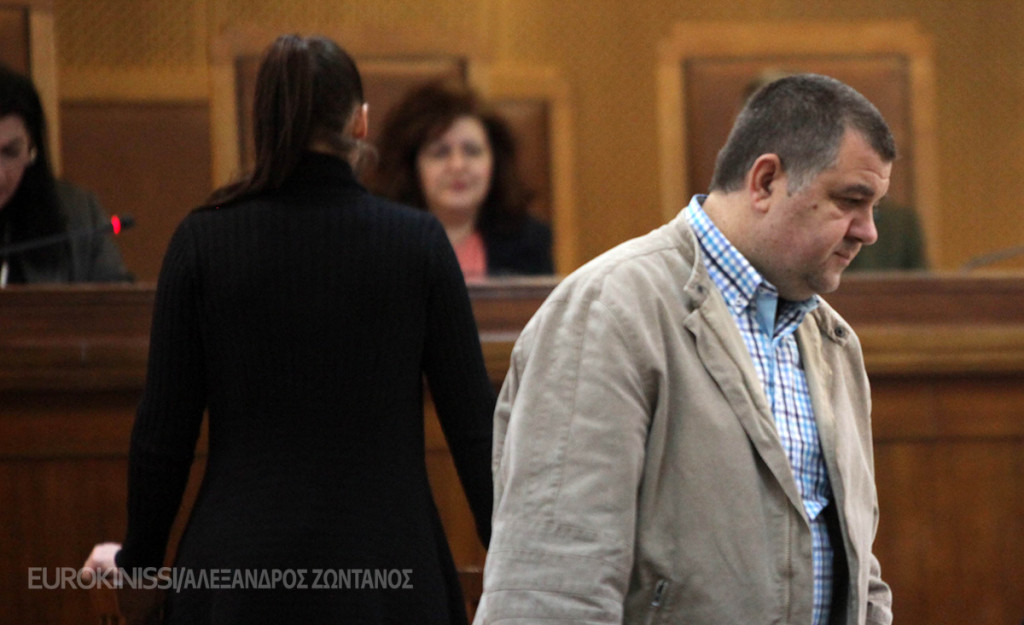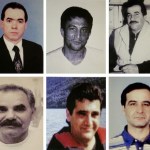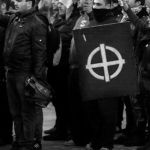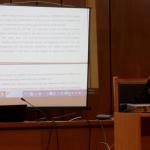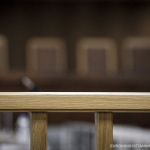41st Hearing, Women’s Section, Korydallos Prison, Athens 22 December 2015
I. Court access
Hearings remain accessible to members of the public, provided they present their identity cards at the entrance. The crowd was smaller than at the previous hearing. The spaces reserved for journalists are almost always occupied.
II. Presence and representation of the defendants
Eight (8) defendants were present at the beginning of the hearing; thirty-one (31) were registered as absent. The remaining defendants were represented by their counsel.
III. Civil counsel’s comments on Angeliki Legatou’s evidence
The court called on the civil counsel to comment on the evidence of Angeliki Legatou, a police officer with the Dias motorcycle unit. The most significant points are noted here.
Andreas Tzelis (for the Fyssas family) began by describing the witness’s testimony as “problematic” and “riddled with contradictions”, adding that much could be said on the matter of the police’s conduct that night. He deemed the witness to be entirely unreliable as regards the timing of the event and her unit’s coordination with the Perama Dias motorcycle unit. The counsel pointed out that the court already has access to the police station’s records, which include the timeline of the event together with the communications of the units with the station. He also drew attention to the witness’s own statement that, until she crossed Tsaldari St, her vision was limited by her helmet. The counsel concluded that the witness, in giving her evidence, was guided by the same interests that had shaped the testimonies of the other police officers involved, save for the select few who had chosen to honour their office.
Violetta Kougiatsou (for Magda Fyssa) suggested that Legatou’s testimony pointed to the police’s absence and/or unwillingness to intervene in the assault, given no arrests were made apart from that of Giorgos Roupakias and, moreover, that the police implicitly defended the other individuals involved on grounds that “they did nothing illegal”.
Ellada Christodoulou (for the Fyssas family) commented that the witness confirmed the premeditated nature of the gathering and of the attack. Pointing to the witness’s weaknesses, the counsel raised Legatou’s description of the murder weapon as a “little knife”, even though the witness herself had never seen it. Moreover, she qualified Legatou’s description of Fyssas, a man who had just been stabbed in the heart, as “infuriated” as inappropriate and unethical for a police officer. Finally, the counsel pointed out that Legatou had attributed responsibility for the murder to everyone but the police.
Chrysa Papadopoulou (for Irini Fyssa) took the floor and noted that the witness had been vague on several matters, such as whether the men were actually holding bats. Moreover, she said the witness’s suggestion that the riot police should have been sent in were laughable given the amount of time it would have taken them to reach the scene. The counsel insisted that there was no logical motive for the police’s decision to arrest only one of the 15 to 20 people involved in the assault. She concluded by pointing to gaps in the witness’s evidence; there were periods of time for which the police’s movements remain unaccounted.
Eleftheria Tompatzoglou (for the Fyssas family) stated she could not understand the witness’s testimony; according to the counsel, the witness did not answer any questions. She stated her belief that the police never ran after the group of 15 to 20 people at all; rather, they remained as simple onlookers to the two assaults on Fyssas. She described the witness’s insistence that the police “did everything they could” to prevent the murder as “impertinent”, adding that Legatou had confirmed that Golden Dawners not only felt immune to the police, but were convinced that the police would actually cover their crimes.
Takis Zotos (for the Egyptian fishermen) suggested that the contradictions in the witness’s evidence arose from her attempt to conceal the police’s negligence and her own. He, too, stated his doubts as to whether the police did, in fact, run after the group of 15 to 20 people.
Thanasis Kampagiannis (for the Egyptian fishermen) stated that the police had souled its nest that night as demonstrated by the fact that they made only the one arrest. It remained unclear whether they themselves arrested Roupakias or whether they retrieved the knife. They did not take down the details of Fyssas’ friend who was there or of the nurse who offered her help. They also never mentioned the violent attack on one police officer, Christos Deligiannis. Rather, the witness was only happy to discuss matters that did not run the risk of raising suspicions about the police, such as the fact that the men gathered on the scene were, in fact, Golden Dawners.
Kostas Papadakis (also for the Egyptian fishermen) wondered why armed policemen should have felt afraid of a gathering of people. He added that the police officers should themselves stand trial, explaining that many people not seated in the dock bear the same responsibility for the murder as those who were.
Takis Sapountzakis (for the PAME trade unionists) stated that the witness’s testimony confirmed the existence of a criminal organization, demonstrated by the witness’s fear [on the night] and by the fact that the witness herself suspected the Golden Dawners of having planned the attack in advance. As regards the passenger in Roupakias’ car, the counsel pointed out that it was possible that the witness may not have been able to have seen him, given she arrived at the scene after the stabbing had taken place.
Eleni Zafiriou (for the PAME members) noted that it emerged from the witness’s evidence that four or five men had encircled Fyssas and facilitated Roupakias’ assault; that the group of 15 to 20 people had broken away from the original 50; that no arrests were made; that the men assembled were Golden Dawners affiliated with the party and that eyewitness Paraskevi Karagiannidou was not only present but had told the truth.
Thodoris Theodoroupoulos (also for the PAME members) stated that the witness had confirmed that the men chasing Fyssas were Golden Dawners and that they were responsible for his death. Moreover, he pointed out that, despite the witness’s best efforts to evade the matter, it was significant that 30 men were standing across the street from the murder scene.
IV. Defence counsel’s comments on the Angeliki Legatou’s testimony
The court called on the defence counsel to comment on Angeliki Legatou’s evidence. The most significant points are noted here.
Nikos Kontovazenitis (for Anastasios Anadiotis) took the floor first for the defence, stating that there was nothing in the witness’s testimony to suggest that specific individuals had been assigned particular tasks or that the assault had been coordinated in advance. Her testimony indicated that only four people had been involved in the murder. The counsel said the witness was reliable like all the police; were it otherwise, miscarriages of justice would be a daily occurrence.
Dimitra Velentza (for Thomas Barekas, Aristotelis Chrysafitis, Elpidoforos Kalaritis, Ioannis Kazantzoglou, Nikos Kouzilos and Theodoros Stefas) said that the witness had confirmed that the individuals were scattered around the area; that she had not heard insults being shouted; that she didn’t see people gathered on Tsaldari St. The witness had spoken clearly of a “squabble” or misunderstanding and of a fight in which Fyssas was the more aggressive party.
Vasilis Oplantzakis (counsel for Ioannis Kazantzoglou) reiterated his request that the witness be cross-examined with witnesses Dimitra Zorzou and Karagiannidou. He pointed out that the witness did not hear anyone encourage Roupakais and had struggled to understand whether Roupakias was the instigator or the victim of the assault.
Christoforos Tsagkas (for for Giorgos Germenis and Anastasios Michalaros) stressed that witnesses who had taken the stand know what they did about the assault divisions from the media, which cannot be considered as a reliable source.
Roupakias’s counsel, Giorgos Roumpekas, insisted that the witness clearly referred to a scuffle and added that the fact that the four men surrounding Fyssas were wearing black and had buzz cuts did not necessarily make them Golden Dawners. Moreover, the counsel said that the matter of whether Roupakias was himself wounded remains to be investigated; he repeated his belief that Fyssas had started the fight.
Yiannis Zografos (for Antonis Gregos and Nikos Michos) defended the sincerity of the witness’s statement that they “did everything [they] could”, while accusing witnesses Zorzou and Karagiannidou of lying and of following party interests. He concluded that the witness’s testimony was in no way indicative of the existence of a criminal organization or of incitement to murder.
In a similar vein, Nikos Roussopoulos (for Ioannis Lagos) accused witnesses Zorzou and Karagiannidou of engaging in lies and fabrication, claiming their evidence reflected their own partisan bias. Finally, he stated that the assault battalions were the brainchild of former prime minister Antonis Samaras and the media.
V. Evidence of Dimitris Bagios, police officer in the Dias motorcycle unit
The court then called on the 15th witness, police officer Dimitris Bagios, a member of the Dias motorcycle unit, to give evidence.
In summary, the witness’s testimony was as follows:
“I have served in the Piraeus Dias motorcycle police unit since 2012. That night I was working a shift in Keratsini. I was driving the bike; officer Biankis was riding with me. There was one other bike in our unit: Tsolakidis and Legatou rode that one. We received a call around 23:59 and were told that 50 people carrying bats were heading towards the Koralli bar. We got there and parked almost right outside the bar. I saw 40–50 people scattered everywhere along Pavlou Mela St. The image matched the police station’s description. I, personally, did not see any bats, though I did see three or four men carrying helmets. Many of them were well-built and wearing black. Tsolakidis spoke to Hatzistamatis [the alleged go-between]; Legatou stood next to him. I didn’t hear what they were saying – I don’t know about Biankis. A Perama Dias unit also showed up. I didn’t approach the 50 men – my job was to observe. We assign these roles – that of the observer, the speaker etc. – ourselves; we’re trained to by our superiors. I didn’t see the 40–50 people do anything, but I got the impression that something was going on inside the bar. None of us went in there to see what was going on. I just concentrated on making sure no one ran up on us from behind. Then, 15–20 people out of the 50 started to run. They saw someone on Tsaldari St and started to shout out, “There they are! Faggots! Chickens! We’ll fuck you up!” We ran after them. Biankis was carrying the heaviest weapon so I looked out for him – I always look out for my colleagues.”
The presiding judge, Maria Leponioti, asked the witness whether he “looked out” for the civilians whom it is his job to protect. The witness replied that they were all on the same spot. The witness said he could not remember whether he was wearing his helmet, to which the judge responded that it was his responsibility to remember and to observe. She asked him to describe exactly what he saw when he reached the median-strip on Tsaldari St. The witness replied that when he got there, he saw people running up and down the street; they weren’t doing anything in particular – in fact it seemed to him that they were not linked to the others he had seen on Mela St. When he got to the median strip, five to six people dressed in black, looking very much like the 50 people he had seen earlier, were leaving the scene; Deligiannis and Legatou were on Fyssas and the other policemen had grabbed another man. The judge commented that the witness seemed to have seen remarkably little for someone whose job it was to observe and help; most of his statements were variations of “I don’t know” and “I can’t remember”. She asked the witness what difference his presence in the area had made, to which Bagios responded that the police had no idea what was going on and were trying to gather information. The judge asked him whether he maintained his role as “the observer” throughout and whether he thinks he fulfilled it.
The witness claimed he did not feel well and asked for a break. The judge called a 15-minute recess. On his way out, the witness collapsed among the seats reserved for the civil counsel.
At this point, the court adjourned until 9am on Wednesday, 23 December 2015.
VI. Comments on the proceedings and on the atmosphere in the courtroom
The proceedings progressed smoothly, with relatively few clashes between civil and defence counsels, including in their comments on Legatou’s testimony. The judge did not have to resort to calling a break to restore order, but she did have to delay the proceedings to deal with a malfunctioning microphone, which posed difficulties to her questioning of police officer Bagios. The witness seemed flustered by the her persistent questioning regarding the police’s role that night; his anxiety culminated in him fainting, which brought the hearing to an end.

